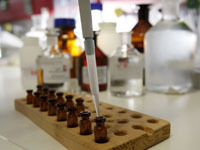Healthy cells can become cancerous after series of random mutations
 For the last decade cancer research has been guided by a common vision of how a single cell, outcompeting its neighbors, evolves into a malignant tumor.
For the last decade cancer research has been guided by a common vision of how a single cell, outcompeting its neighbors, evolves into a malignant tumor.
Through a series of random mutations, genes that encourage cellular division are pushed into overdrive, while genes that normally send growth-restraining signals are taken offline.
With the accelerator floored and the brake lines cut, the cell and its progeny are free to rapidly multiply. More mutations accumulate, allowing the cancer cells to elude other safeguards and to invade neighboring tissue and metastasize, says New York Times.
Healthy cells can become cancerous after a series of random mutations, causing some genes to be activated and other shutdown. As a result, the cell may begin to divide and proliferate, driven by genes that are over activated and genes for regulations are shutdown. Without regulation and with a green light to proliferate the cell mass will continue to grow and multiply into a tumor. With more frequent divisions, more mutations occur and progeny cells accumulate more mutations, altering their function and regulation.
With this general outline for how cancerous cells grow into a tumor, new discoveries are adding another level of complexity to the mix. These cancerous cells appear to be more willful that previously thought, informs The State Column.
Dr Lesley Walker, Cancer Research UK's director of cancer information, said: "A huge challenge in successfully treating cancer is stopping it from spreading around the body, and keeping cancer that has already spread at bay. Most deaths from cancer are caused when cancer cells travel to different parts of the body and grow as secondary tumours.
"Discovering how cancer cells can funnel grooves though tissues, to squeeze away from primary tumours and spread to new sites, gives scientists fresh understanding of ways to stop cancer spread - literally in its tracks", according to ecancermedicalscience.
Subscribe to Pravda.Ru Telegram channel, Facebook, RSS!


